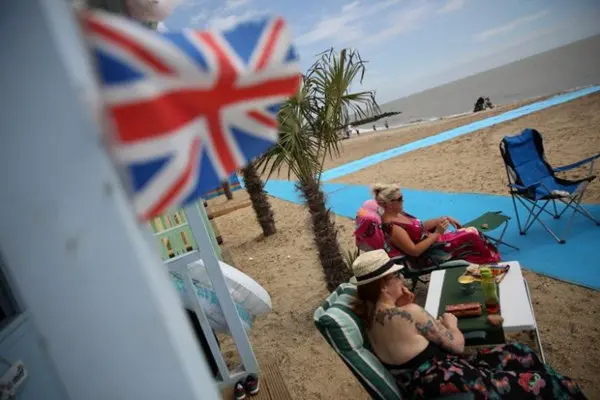North American tourists flocked into Britain to take advantage of the weak pound after last year's Brexit vote, but spending by European tourists - far greater in number - slipped compared with a year earlier.
Taken as a whole, Thursday's official data suggested there was little immediate boost from the weak pound to Britain's tourism industry during the three months after June 23's referendum, typically the busiest period of the year.
People relax in front of beach huts in Clacton-on-Sea, a town in eastern England, where 70 percent of people voted on June 23, 2016 to leave the European Union, Britain August 22, 2016 / REUTERS
Domestic and foreign tourism accounts directly for about 4 percent of Britain's economy, according to official statistics, though the industry says the broader contribution is larger.
Britain's economy has exceeded most forecasters' expectations since the vote to leave the European Union, which sent the pound to a record low against a basket of currencies.
While this has already produced clear signs of inflation, evidence for a boost to exports - and now tourism - has been mixed so far.
Total spending by overseas tourists, seasonally adjusted, fell to 5.4 billion pounds ($6.7 billion) for July to September from 5.6 billion pounds in the second quarter, the Office for National Statistics said.
Meanwhile, the actual number of visitors increased only marginally to 10.655 million from 10.5 million a year earlier.
But there were big shifts in the composition of visitors from different countries.
The number of North American tourists visiting Britain during the third quarter rose to 1.543 million from 1.397 million a year earlier - a more than 10 percent increase.
Their spending increased by 202 million pounds to 1.359 billion pounds, a 17 percent rise that is roughly equivalent to the pound's depreciation against the U.S. dollar between the third quarters of 2015 and 2016.
"(This) does suggest that there was some boost coming from the plunge in the pound against the dollar following the late-June Brexit vote," said Howard Archer, economist at IHS Markit.
"There were reports that retail sales were boosted over the summer by foreign visitors taking advantage of the weak pound to buy expensive items such as jewellery and watches."
However, there was little sign the weaker pound did much to attract European visitors, who usually account for about three-quarters of all tourists in Britain.
Their spending edged down to 3.289 billion pounds from 3.348 billion pounds a year earlier, despite the pound having weakened against the euro by around 14 percent during that period.
The number of visitors from other European countries was little changed at about 7 million.
Prime Minister Theresa May has described tourism as "vitally important" to Britain and wants to make the country a more attractive destination as it leaves the EU.
(REUTERS)
 简体中文
简体中文

